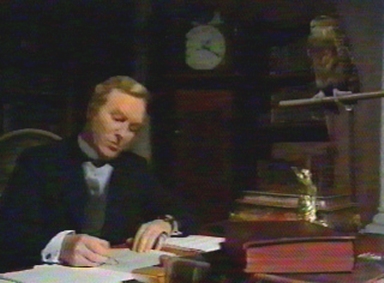
The Incredible Robert Baldick
Mad Dog > Filming locations > The Incredible Robert Baldick >

|
The Incredible Robert BaldickMad Dog > Filming locations > The Incredible Robert Baldick > |
   |

The story of The Incredible Robert BaldickDuring a dark and stormy night in the village of Boardington, a young woman named Sarah Chislet is discovered to be missing. Joining the search for her, the local Squire, Charles Aldington, and the Reverend Elmstead head for the reputedly haunted ruins of an abbey in nearby Duvel Woods. There, amidst the of clamour of apparently supernatural activity, they discover Sarah's corpse — the latest victim to be found in a place feared by locals. Elmstead decides to visit his long-standing friend Robert Baldick, in the hope that the brilliant — if somewhat eccentric — gentleman sleuth will assist with the investigation into Sarah's death. Aided by his two associates — Thomas Wingham and Caleb Selling — Baldick travels to Boardington on his private train 'The Tsar'. He learns of the macabre history of the old abbey and of the number of unexplained deaths connected with it. Meanwhile, the local villagers have already decided that Sarah's husband-to-be Seth Marden is guilty of the crime and are trying to hunt him down.
Baldick and his colleagues delve into local parish records and into the fabric of the building itself, and discover that the site has long been associated with evil and human sacrifice. In earlier times, a light was kept burning in the abbey at all times to prevent the darkness from enveloping it, to ensure that within its walls would 'never come night'. Reverend Elmstead attempts an exorcism, but is thwarted by what appears to be a malevolent presence. Baldick decides to excavate deeper within the abbey's crypt, searching for signs of a presence that might have existed 'even before man'. As the digging continues, fear and anxiety grip the group. As the floor gives way, Thomas is pulled into a chamber below, full of human bones and pervaded by a sense of absolute evil. Baldick is convinced that the abbey contains some sort of distillation of the terrors and phobias of all the people who have visited the site — and that those that have died here (including Sarah) have been consumed by their own deepest fears. He returns to 'The Tsar' where he discovers, to his great anger, that the village mob have found and killed the innocent Marden. Baldick returns to the abbey where, confronting a childhood terror of his own, he thows a flame into to the chamber — which is engulfed in fire. In returning it to the light, he purges it of evil.
Baldick later studies a strange object he retrieved from the floor of the abbey — a small metal box containing what appear to be intricate electrical components and strange symbols — a mysterious item completely out of place in the Victorian age. Baldick concludes that the artifact must either have come from 'the past... or the future?' CommentaryThe Incredible Robert Baldick draws heavily on a varied range of easily-identifiable influences, to produce a drama that is more intriguing than it is engrossing. 'Never Come Night' hints strongly at the possibilities future storylines might have offered, without really develivering that compelling first instalment necessary to its success as a 'pilot'. The character of the 'gentlemen sleuth', the gifted man of means with a brilliant analytical mind, invites immediate comparisons with Sherlock Holmes, amongst others. His talented and loyal assistants, Thomas and Caleb (who are both his servants and his investigative agents), are recogniseable mainstays of detective fiction of the Victorian age. The dark and windswept night with which the story opens; the superstitious villagers; the hunt for the missing girl; the wrongly accused defendant; the 'dark secret' found in the wood; the ruined abbey; the failed excorcism — all of these are staples elements of many a Hammer gothic horror. That people's 'darkest fears' return to haunt them is a recurring theme of ghost stories and supernatural tales. The inventor whose gadgets and mindset show that they are ahead of their time is an equal familiar feature of the literature. The final genre element that Nation introduces at the very end of the story — the time-travelling, fantasy motif, represented by the 'alien' artifact — is perhaps the least successful of all. Rather than delivering a suprising final payoff, it serves instead to upset the terms of the narrative that Nation has introduced to that point, without offering any kind of resolution. It is more frustrating than it is unexpected.
As a result, 'Never Come Night' never really gels as more than an amalgam of its various parts. The programme's production values are good — 'The Tsar' makes for a particularly impressive 'prop', and the location film work is convincingly staged and shot. The series format had some clear potential, particularly if the programme's budget could have supported 'The Tsar' criss-crossing the continent of Europe (or at least giving the impression that it was). Baldick himself — played with the expected aplomb and gusto by Robert Hardy — certainly makes for an engaging central figure. Hardy would clearly have excelled in the part, had he been given the opportunity to make the role his own. Given more to do, Thomas and Caleb might have become more interesting and rounded characters, with the tension between their conflicting roles — as both Baldick's colleagues and his servants — becoming more pronounced as their adventures continued. However, it is not a particular surprise that the BBC decided not to commission a full series of The Incredible Robert Baldick on the strength of 'Never Come Night', which must be judged as an interesting entry in Nation's extensive canon of work rather than an obvious highlight. Mad Dog > Filming locations > The Incredible Robert Baldick >
Page last updated: |